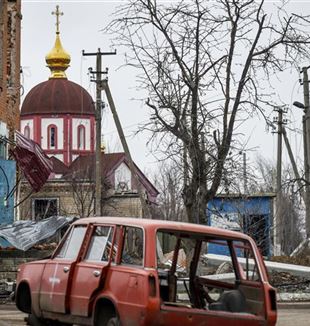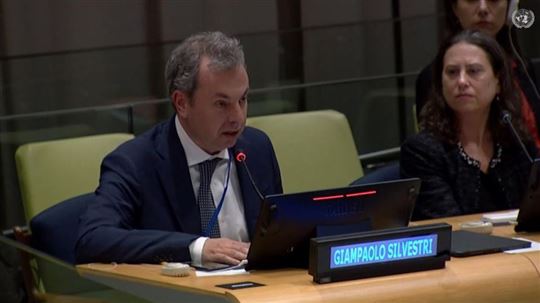
Peace is everyone's or nobody’s
"Ukrainian children cannot be forgotten, not even for a moment." One year after the start of the conflict in Ukraine, Giampaolo Silvestri, secretary general of AVSI spoke at the United Nations.On the morning of February 24, 2022, the world watched and listened stunned to news of the first Russian bombings on Ukrainian soil. No one would have thought that a year later the situation would still be so dramatic and difficult. On the anniversary of the conflict, on February 22, the Permanent Representation of Ukraine together with those of 36 other countries sponsored an event at the United Nations headquarters in New York.
Among the speakers was Giampaolo Silvestri, secretary-general of AVSI, who was invited to speak on the topic of protecting children's rights in contexts of war. "As I said during my speech, we think of them first on this anniversary," Silvestri explained over the phone, "They are paying an unacceptable price and cannot be forgotten. Not even for a moment. The main resources must be for them because they are the present and the future of Ukraine and all of us. We can no longer think of ourselves as separate from the world's most vulnerable: our destinies are united. And this means investing, as soon as possible, all possible resources in interventions that allow children to believe that they can expect a good future."
According to Silvestri, "even in a situation of war, education remains fundamental, in all possible forms: rehabilitating schools, in person or distance learning, creating ‘friendly’ spaces for children with recreational and after-school activities, initiatives that guarantee an educational path, and at the same time support for the families and the community of adults where minors currently live." Not to mention psychological pathways, which are indispensable in conditions of war.
The figures AVSI provides are frightening: 429 children dead and 808 injured; more than 2,900 educational centers have been bombed, 580 of them completely destroyed. "AVSI works in areas where there is no fighting," added the head of the Italian NGO. "The problem is that there is no prospect of a solution, for now. Such a situation is not sustainable in the long run, and does not allow us to think about what kind of future to offer these children.”
If education is based on the premise that "the other is good for you," the difficult thing remains how to demonstrate this beyond words, especially in war contexts: "We work for peace and through aid that shows that others are a value. And in a context of war, it is an enormous challenge." With data in hand, AVSI has supported 195,000 people through 25 projects in one year in response to the emergency in Ukraine, but also in Romania, Poland, Moldova and Italy with the welcoming of refugees, through 134 people, expatriates and locals. In Italy, for example, there is the "Hub Help Ukraine" in Milan, an information and coordination point for services for Ukrainian refugees and a networking service for those offering help and those in need. "And just a few hours ago the Council of Ministers renewed special permits for Ukrainians," Silvestri added, "The Hub opened to take care of Ukrainians and will continue to do so by expanding its services to refugees from other parts of the world as well. Let us not forget that there are so many crisis situations. Think, for example, of the earthquake emergency in Turkey and Syria."
"We must all be aware that the fate of Ukrainian children is extremely linked to that of our children and ours,” concluded Silvestri, in the same way he ended his speech at the UN. "We cannot think ourselves safe if others are not. Peace is everyone's or nobody’s."